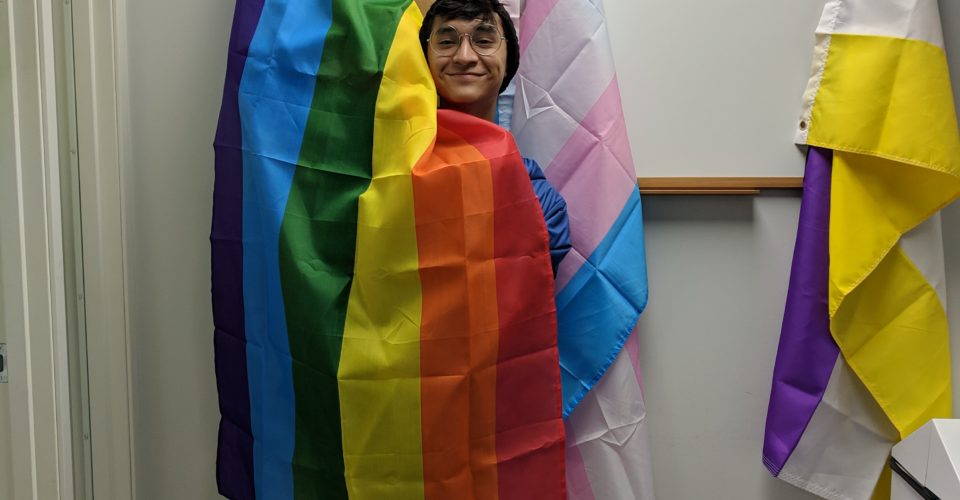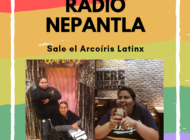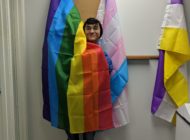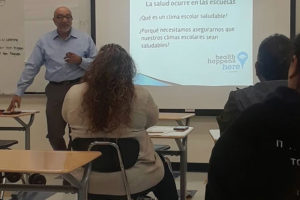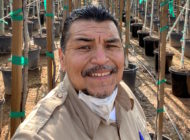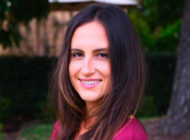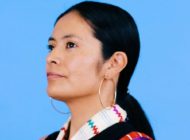Alejandro Soria, director of The Village Family Services Drop-In Center, and student Matthew Contreras, employee specialist, talk about their experiencing working with LGBTQ youth that come to the center to get off the streets.
By GILLIAN MORÁN PÉREZ
EL NUEVO SOL
Behind a pair of white doors in the corner of a public clinic, youth at risk of being homeless find a haven that will help them get off the streets, if they really want to change their situation.
Alejandro Soria, 50 years old, is the director of The Village Family Services Drop-In Center, a place where youth living off the streets can find housing, job opportunities, health care and more. Most of the youth that come in identify themselves as LGBTQ.
“At least half of them identify as LGBTQ” said Soria, “but at the beginning they don’t want to identify themselves”.
In 2018 True Colors United, a non-profit organization that advocates for LGBTQ youth, found that one of the most common reasons LGBTQ youth are living on the streets results from being rejected from their families after coming out.
It is estimated that LGBTQ youth are twice as much at risk of being homeless than cisgender youth. A study conducted by Chapin Hall at the University of Chicago found that 20 percent of homeless youth in the U.S. identify themselves as LGBTQ, and in other urban areas the number rises to 40 percent despite that they are only 7 percent of the total youth population.
However, Soria explains that in his experience, sexual orientation is the secondary reason for why youth live on the streets. There is a combination of reasons that youth identity in a survey once they arrive at the drop-in center.
According to Soria, LGBTQ youth show up with problems such as substance abuse, mental health issues or parents that have the same problems.
“If these kids only had to deal with one concern, they wouldn’t be on the streets,” Soria said.
Soria explains that there were moments the parents of the youth would come visit and tell them that drugs, not their sexual orientation, were the reason they were kicked out.
“Don’t blame your identity, it’s only a piece of you, it was your behavior that got you kicked out,” Soria tells them.
There are cases where the youth are chronically homeless and those who stay for a few months then disappear. Some prefer not to leave housing while others come to only use the services. Matthew Contreras, 20, is an employee specialist and a student at California State University, Northridge (CSUN). Contreras mentions that there is a client with serious problems who only comes to use the services but does not seek to help himself.
As Contreras is driving down the street he will see his client pushing a cart full of his stuff, collecting bottles and looking for food.
“It hurts a lot and calls my attention,” Contreras said. According to him, his client has rough nights on the streets as he comes in the next day with bruises all over.
Contreras job is to educate the youth how to find work, create a resume and other social skills that they may lack. On Saturdays, Contreras travels with a partner to North Hollywood Skate Park and homeless encampments, distributing backpacks full of snacks and necessities while getting to know them.
“I’m the person that talks to them and gives them food, I understand what they need,” Contreras said.
He feels overjoyed at his job because he gets to understand a population that is so often overlooked. Contreras relates a lot with the youth and considers them his friends. At one point he had to live with his best friend for a year due to family problems after coming out as gay. He dropped out of school for one semester because he struggled paying for necessities. Now he has a better relationship with his parents and is more involved at CSUN.
Before working at the Drop-In Center, Contreras participated in a panel discussion to celebrate Gay Latino Day. His parents and even Queer Studies professor Matthew Clements showed up for support as he told parents his coming out story. His mom had stood up and affirmed her love for him, telling all the parents it was okay to accept their child.
Contreras explained that the LGBTQ community are misunderstood by others. There is already a stigma for the homeless, but it is worse for those of the LGBTQ community. “It is not the job of the queer people to educate the non-queer,” Contreras said.
The San Fernando Valley has different recourses for LGBTQ such as the San Fernando LGTBQ center, SOMOS FAMILIA, CSUN Pride Center and Kaiser who has a program of services for the transgender community. Soria commented that councilwoman Nury Martinez established a LGBTQ coalition for the valley that helped the different community centers exchange references and information. Yet, Soria and Contreras expressed that the valley lacks a core center in comparison to the LA LGBTQ Center. Soria recalled growing up in the 80s when the HIV/AIDS epidemic took away the lives of his friends. In comparison, one can live with HIV and have access to clinics such as The Village.
Soria mentions that there are few who come back after getting off the streets. There is an employee who once came to The Village searching for a place to stay and a job but now currently works as an employee specialist and peer support specialist.
Even though those who come disappear after a while, Soria expresses that his job is for long-term success.
“For us success is for them to be stable,” Soria said. He reveals that the youth go through relapses and that is why he says that those who really want to get off the streets would have to accept the help and assume personal responsibility.
Tags: CSUN student Gillian Morán Pérez Matthew Contreras North Hollywood The Village Family Services







